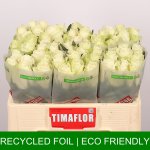Simon van der Burg, owner TIMAFLOR Ltd.
Simon was one of the first flower growers in Kenya. In 1974 he started growing carnations on 5 hectares and within a decade this grew to ca. 100 hectares. Since then, Simon has also worked in marketing and Dutch floriculture companies. For a variety of reasons, in 2006 Simon started a new company in Kenya, this time growing roses “I was back in Kenya again!
The Reliability of roses
What lies behind Simon’s burning ambition? It’s easy if you enjoy your work and also, if it’s a hobby “laughs Simon” I enjoy managing people and also delegating responsibility. Also, what’s most important is the consitent quality of the roses. My employees spend all day cutting roses. Here in Kenya, I am in charge of 6 rose-growing sections of geenhouses and 2000 Kenyan workers. Each greenhouse is organised along similar Lines, which helps quality assurance.
Not in the office
Simon believes that a manager should spend more time on site, among the workers, than in the office. “You need to focus on quality and in the greenhouse is where that happens. This is especially so with roses which can grow a lot in one day. The output per square metre is high. This part of Kenya has an ideal climate for rose growing, plenty of sunshine, little rain.
Each variety is different
Why did Simon end up with roses? “Roses are for me the most profitable flowers to grow in Kenya. I have now grown all kinds of flowers and markets, but the rose is truly unique. There are thousands of varieties of roses in all shades of pink, white,red, orange and yellow. And each type is different. Because there are so many varieties of roses, you can produce a high enough volume for large sales, bulk sales at auction”.
Give them self-esteem
How does Simon treat his 2.000 employees? “Working on the farm changes them. It gives them a purpose in life, their job means everything to them. There is not much work in Kenya, for each job we advertise, there are 200 applicants waiting in a line. My motto is: Look after your workers. We try to treat each worker as an individual and encourage them to take responsibility for their work and work with minimal supervision. An average Kenyan doesn’t question authority. And, as well, they are always cheerful.
ALTIMA
In addition, we started in November 2018 with a new Altima nursery located at 2,550 meters, Altima – a contraction of altitude and Timaflor. A bit higher, but it really makes a difference.
New farm MLIMA
In October 2021 we expect the first stems of the new garden Mlima. Mlima has an area of 24 ha and is located next to the Timaflor and Altima gardens at an altitude of 2,550 meters.

